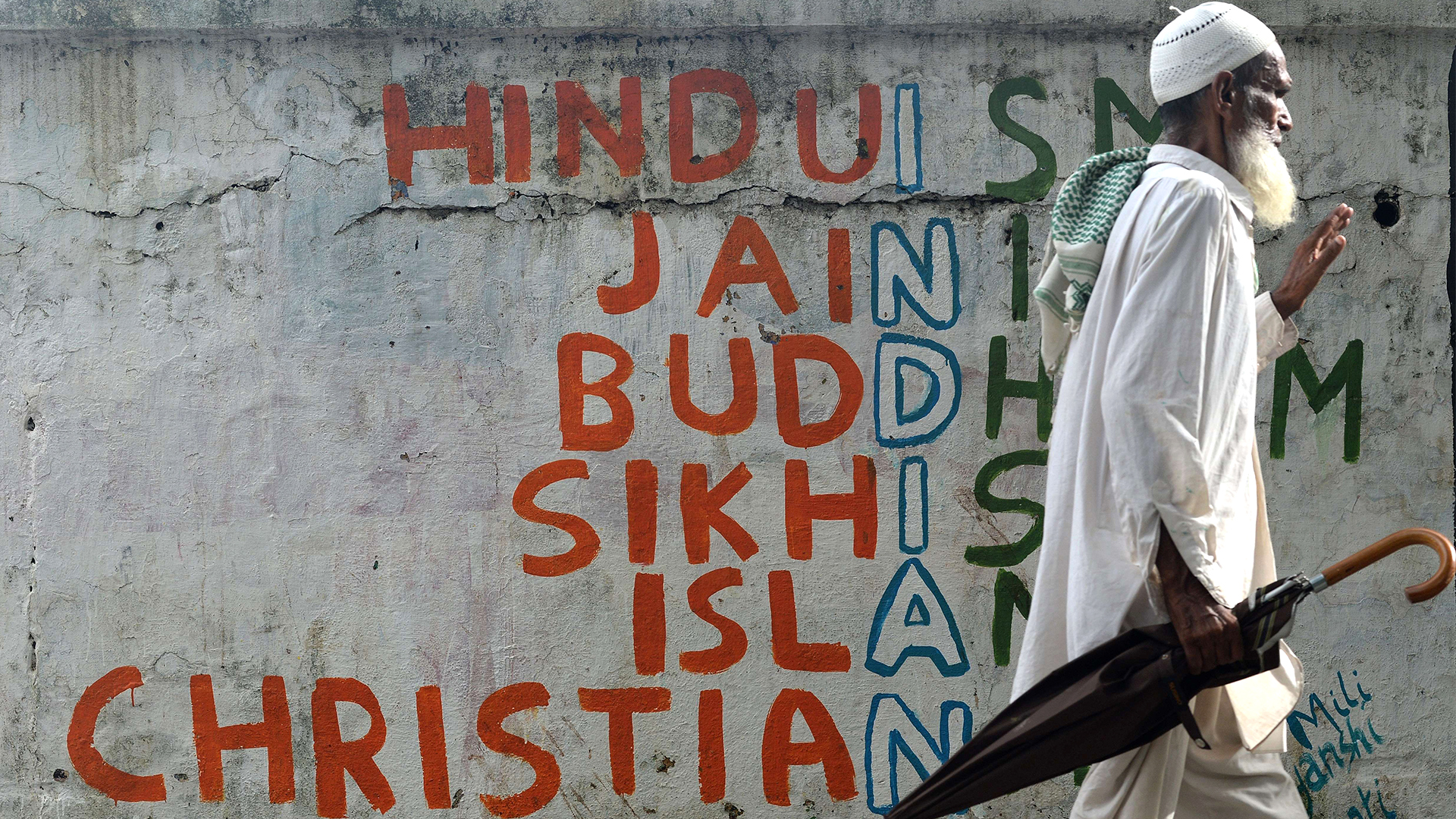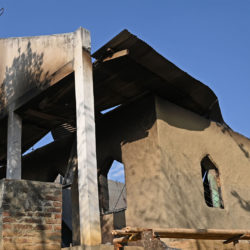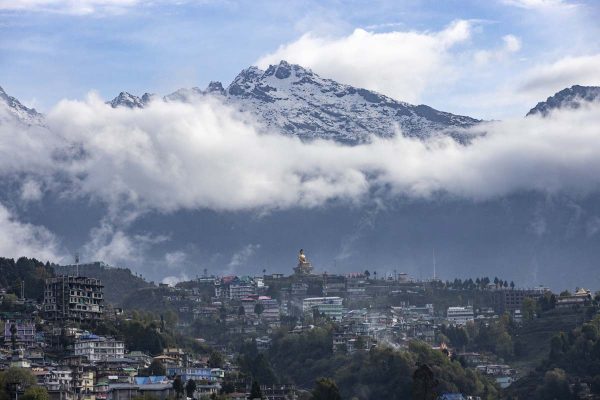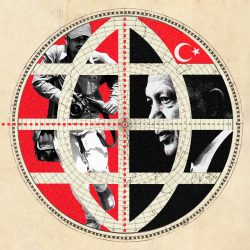
INDRANIL MUKHERJEE/AFP via Getty Images
A law intended to unite India splits the nation
Since May, Indian Prime Minister Narendra Modi has been on a triumphant world tour. In Sydney, as the Indian diaspora chanted Modi’s name in an indoor stadium, Anthony Albanese, the star-struck Australian prime minister, said even Bruce Springsteen had not received such a reception at the same venue.
“Prime Minister Modi,” declared Albanese, “is the boss!”
In the United States in late June, Modi’s visit was afforded the highest level of ceremony, with President Joe Biden describing the relationship between the two countries as one of “two great powers that can define the course of the 21st Century.” Just last week, Modi was feted at the Bastille Day parade in Paris and was awarded France’s highest national honor. It was, Modi tweeted, evidence of the “deep affection” the French hold for India.
Beneath the diplomatic platitudes and expressions of abiding friendship, though, were rumblings of discontent with how Western governments are choosing to ignore the facts of Modi’s divisive reign in India.
To wit, public conversation in India and most of the airtime devoted to news is currently dominated by a yet-to-be-drafted law intended to replace India’s diverse, religiously-based personal laws with a set of laws common to all Indians.
The so-called Uniform Civil Code has hung in the background of Indian democracy for decades. It is routinely trotted out, even in the country’s Constitution, as the hypothetical answer to a bedeviling question — can a country of India’s cultural and religious complexity be both pluralist and governed by personal laws applicable to everyone? Rather than trying to legislate on marriage, divorce, adoption, inheritance and other matters that fall into the realm of what is sometimes described as “personal” law, British India deferred to particular communities to resolve these issues according to religious custom.
When India became an independent nation, Article 44 of the Indian Constitution expressed the hope that the “State shall endeavour to secure for the citizens a uniform civil code throughout the territory of India.” In the 1950s, Jawaharlal Nehru, India’s first prime minister, brought all Hindus, and by extension Sikhs, Buddhists and Jains, under a set of common laws. Muslims, Christians, Jews, Parsis, and tribal peoples though, continued to govern themselves by their own separate sets of personal laws.
In the decades since, the notion of a Uniform Civil Code, albeit without specifics, has frequently been invoked by governments as an ideal, a sympathetic means of uniformly applying personal laws to all Indians. Gender equality is frequently brought up as a likely benefit of a Uniform Civil Code. It has nonetheless been resolutely opposed and little progress has been made in conceptualizing an effective common law.
Speaking in the central Indian state of Madhya Pradesh last month, Modi chose to reopen the civil code can of worms. He alleged that people, particularly Muslims, were being misled by opposition parties about the nature of a Uniform Civil Code. Comparing India to a family, he asked if a household could effectively be run if different rules applied to each member.
This homespun truism was taken as an endorsement of a common law act. Though the government has offered no confirmation or timeline for a proposed Uniform Civil Code, its eventual application now is being treated as an inevitability. And it is a key principle of the Hindu nationalist ideologues to whom Modi is loyal. The panicked tenor of the subsequent debate shows how skeptical minority groups are of the Modi government’s intentions.
Apoorvanand, a professor in the Department of Hindi at the University of Delhi, told us that the “Hindutva movement has never shied away from saying that the Indian way of life is Hindu and that the culture of all Indians should be Hindu culture, no matter what faith they follow.” It is, he added, natural, that “all religious minorities see it as a threat to their own traditions and customs.”
The prominent Indian Supreme Court lawyer Sanjay Hegde, famous for his strong civil rights positions, describes the Uniform Civil Code as it is currently conceived as an “imposition.” Despite the contentious debate over a common code, almost nothing is known about the possible provisions of such a code or how it might be written. “What we are saying,” Hegde told us about the position of the Uniform Civil Code’s critics, “is ‘show us a draft, show us how you would harmonize differences.’”
Hegde is alluding to the suspicion that the ruling Bharatiya Janata Party is gaslighting minorities. The calls for a Uniform Civil Code — “one nation, one law” as the sloganeers put it — appear reasonable, even egalitarian. But the BJP’s anti-minority rhetoric has sparked fear that this is yet another dog whistle, another round of anti-Muslim posturing disguised as progressive legislation.
“What the idea of God is to an agnostic,” wrote the Indian scholar GN Devy in the Indian Express, “the proposal of UCC is to India. The idea in itself is absolutely superb. But as soon as one starts placing it in context, it starts looking less so.”
It is an argument that might be extended to India itself, under Modi’s rule. The idea of India, as presented by Modi to receptive leaders across the world, is superb. But in reality it is unraveling. Abroad, Modi argues before crowds of worshipful Indian expatriates and immigrants that India is a beacon of inclusive democracy. At home, his words and actions hew closely to an ideological commitment to aggressive Hindu nationalism, often at the expense of minorities and vulnerable communities, particularly Muslims.
Confronted by a reporter at the White House in June, Modi — who in nine years as prime minister has not given a single press conference in India — insisted that “democracy runs in our veins,” and that India’s democratic values meant there was “absolutely no space for discrimination.”
Shortly afterwards, the reporter was viciously trolled online by Modi supporters who seized upon her perceived ethnic and religious background. The White House condemned the threats as “antithetical to the very principles of democracy.” The Indian government said nothing.
As Modi was showcasing India’s democracy and its potential as a steadfast global power, the northeastern state of Manipur was burning in riots that have led to the deaths of at least 150 people since May and displaced over 50,000. The cause — ethnic and religious violence catalyzed at least in part by the policies of the state’s majority-BJP government.
On July 13, the day before Modi was paraded across Paris on Bastille Day, the European Parliament called on the Indian government to respond to the violence in Manipur “in line with their international human rights obligations.” But Modi has remained largely silent about the civil war-like conflict in Manipur. Jean-Luc Mélenchon, a left-wing French politician who has run unsuccessfully in the last three French presidential elections, said Modi was showing disdain for the values of liberty, equality and fraternity that were celebrated on Bastille Day.
The Uniform Civil Code is being promoted as necessary to consolidate equality and fraternity in India. But with little clarity about the substance of the law, Modi’s calculated references to the code have served only to generate more anxious talk about fault lines. Hegde, the Supreme Court lawyer, says that the common law debate had so far singularly failed to address the essential question: “As a new country, as a constitutional democracy post-1950, what kind of a nation are we building?”
India, Hegde told us, could choose a more harmonious path of seeking to accommodate difference. Or it could go down the path of “forcible integration, like the Han homogenization that happened in China.” He is referring to a systematic erasure of plurality that in effect turns India into a Hindu nation, a stated aim of Modi-supporting Hindu nationalists.
According to Aakar Patel, the former head of the Indian chapter of Amnesty International — which stopped its operations in India in 2020 because of what Amnesty described as an “incessant witch hunt” against its staff and affiliates — the “BJP itself admits it’s going to exclude large parts of the country from the Uniform Civil Code.”
Fearing a backlash from communities with special interests, Sushil Modi, a BJP member of parliament and chairman of the Parliamentary Committee on Law and Justice, has said that tribal groups in the Northeast region and other areas should be exempt from any uniform code. As Patel told us though, “if there’s meant to be ‘one nation, one law’ and then you exclude the Northeast, you’re saying the Northeast is not part of the country.”
Patel insists that the Uniform Civil Code only reflects the BJP’s “negative single point agenda against minorities, particularly Muslims.” Indeed, much of the actual discussion about bringing Indians under a common law, in the absence of a draft bill, has revolved around Muslim polygamy and divorce practices. Sara Ather, a Delhi-based writer and commentator told us that the renewed interest in the Uniform Civil Code among Hindu nationalists was “yet another attempt to make the private realm of the Muslim woman a matter of never-ending public scrutiny and debate.” It has, she argues, “nothing to do with the upliftment of Muslim women but is only a tactic to establish that she needs intervention.”
The Law Commission of India has extended the deadline for public comment on the idea of a Uniform Civil Code to July 28, having already received over five million responses. In its letter to the Law Commission, a prominent Indian Muslim group wrote that the issue of a Uniform Civil Code was being used as a “lightning rod for polarization.” Some BJP governed states, particularly Uttarakhand — a small, mountainous state that is perhaps the earliest adapter of Hindu nationalist initiatives — have already announced their intent to draft a Uniform Civil Code.
It can be argued that without a national draft bill or any basis for a serious discussion in India about the shape of such a code, the polarization that its critics fear has already been achieved. And to Western leaders so eager to embrace Modi, the question will have to be put again, how long can they ignore the Hindu nationalist project to change the constitutional nature of a secular, pluralist India?
The story you just read is a small piece of a complex and an ever-changing storyline that Coda covers relentlessly and with singular focus. But we can’t do it without your help. Show your support for journalism that stays on the story by becoming a member today. Coda Story is a 501(c)3 U.S. non-profit. Your contribution to Coda Story is tax deductible.












